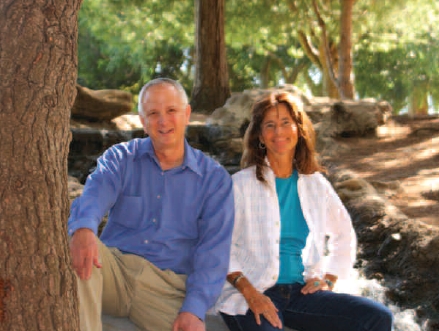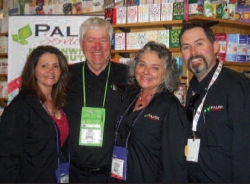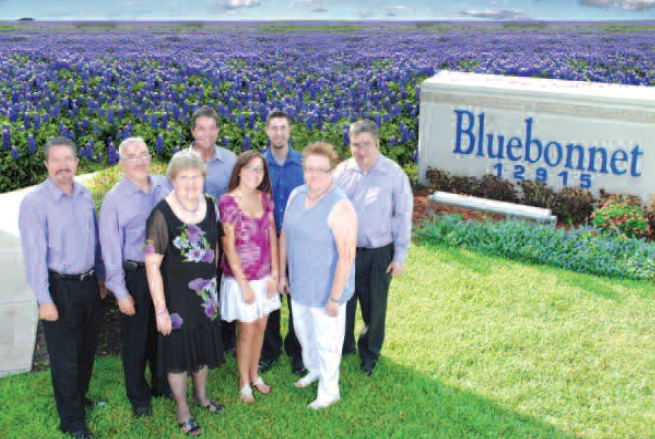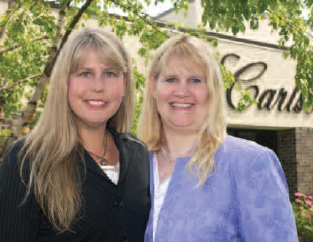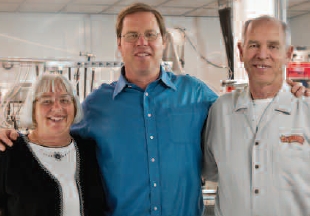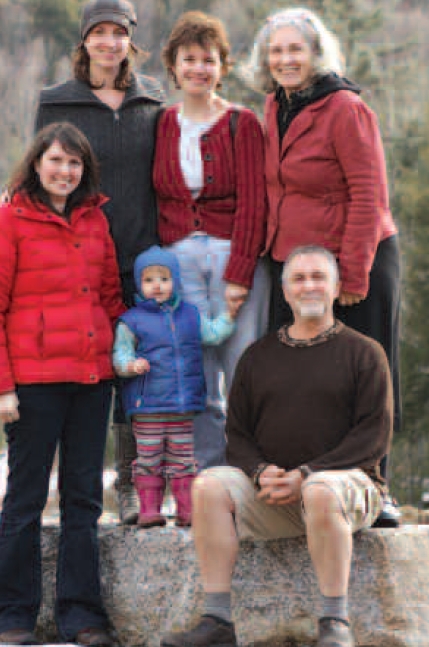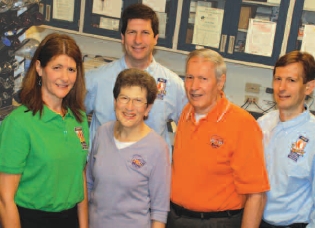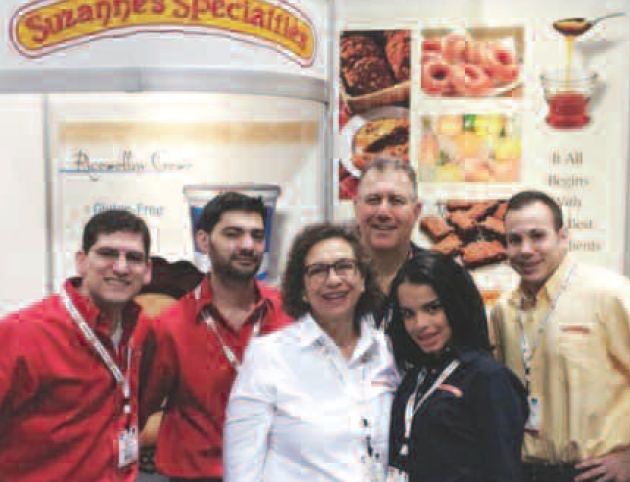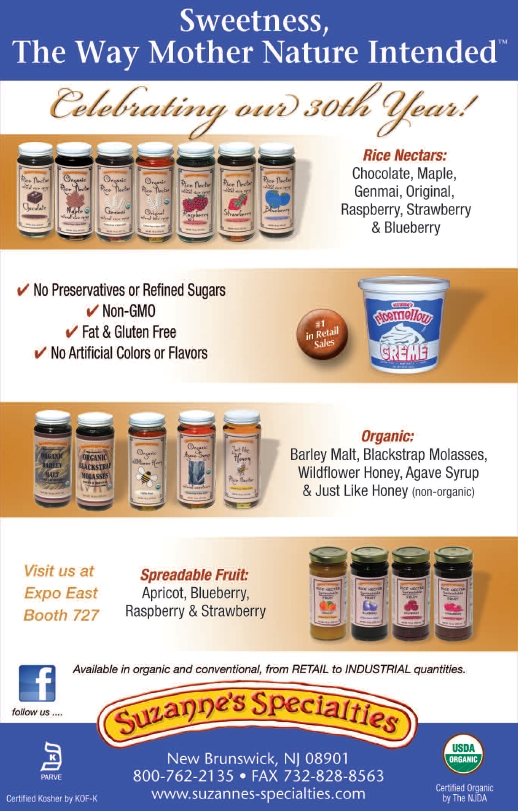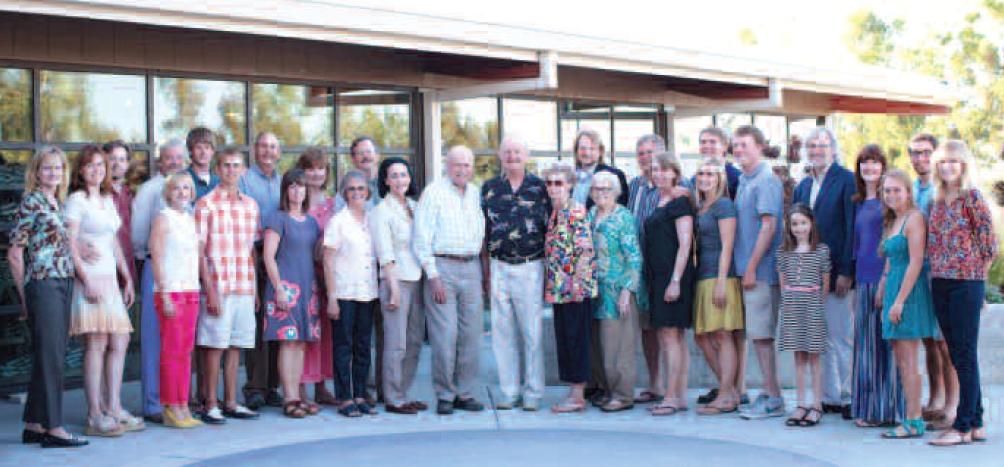Part Six of a Seven-Part Series on Natural Success Stories
I magine owning and operating a company along with those closest to you.
magine owning and operating a company along with those closest to you.
No, not that guy sitting to your left. Your family! Many out there, including store owners, may not need to imagine it, because they already live it. But for the rest of us, the dynamic can be interesting to ponder.
Husbands, wives, sons, daughters, brothers, grandparents and all manner of kin can be involved when a family owns a business. Those relationships, for better or for worse, are embedded in the company’s ethos, and sometimes determine its direction. The occasional tension and conflict that all families endure can be detrimental to a business, but just the same, the bonds of family and the clarity of purpose that such likeminded people can achieve may make all the difference between failure and success. Not to mention that family-owned businesses tend to be high on integrity. Family owners are often aware that their company’s reputation may reflect back onto them, and they work hard to make sure this reflection is a positive one.
Throw in the natural products industry’s special brand of idealism and its unique perspectives, and the stories of these family-owned businesses become both fascinating and instructive. In the midst of these insights and company histories lie important lessons about both business and family ties.
Beyond covering the industry in which they work, WholeFoods Magazine shares another connection with these companies. Our very own Heather and Howard Wainer know what it is to combine business and family, a task in which Heather’s mother and Howard’s wife Sandra Wainer joined them for many years. So, we commend these fellow family businesses, along with all of the others within the industry which we weren’t able to cover here, and hope they continue to flourish.
|
derma e “Something special happens…” There is a bit of magic that takes place, a certain alchemy, when family members get together to form a business. “Something special happens when you’re a family-owned and -operated company. There is a wonderful energy and family dynamic. We are all motivated to make something great happen,” says David Stearn, cofounder and president of natural personal care brand derma e, Simi Valley, CA.
Stearn’s family business saga began in the early 1970s, when he and his father looked into purchasing a health food store. The experience of store ownership exposed them to the wider industry and, as Stearn puts it, they realized their role could be different. “The bond of family was critical in the beginning. As we embarked on uncharted territory, we needed the support, honesty and feedback from our loved ones. To this very day, it is the thread that keeps us together,” he says. Day-to-day life in a family-owned company is always intriguing, he explains, saying, “Every day happens organically and it is always so interesting to see who is going to emerge as a leader.” Stearn believes the natural products industry was built on families with an entrepreneurial spirit and sound ethics. He adds that this is visible today in the types of products available and in the industry’s focus on sustainability and the “triple-bottom line” of people, planet and profit. Meanwhile, the future of family-owned businesses is secure, Stearn argues, no matter the industry, whether it be cars, computers or personal care products. With family values as a baseline, he believes businesses just need to be prepared to succeed, grow and welcome new people into the family. Indeed, as the company he founded with Linda Miles, L.Ac., D.O.M., grew, the “family” also expanded by necessity. Stearn says they knew their success relied on bringing in employees that were kindred spirits who shared their passion and values. This philosophy has positioned the company well for the future. “If you lay the groundwork, and do your job correctly in the sense of hiring the right people, your legacy will continue,” he says. |
|
Palko Services “Large Enough to Serve, Much of the “feel-good” halo surrounding family businesses is due to the perceived distinction between this model and the corporate one, says Steve Palko, CFO of Palko Services, Michigan City, IN. He believes “corporate” entities are sometimes associated with largeness and an unforgiving rigidity, while family-run businesses are often viewed as small, flexible, hard-working, ethical and caring.
Whatever the broad differences may be, treating customers, suppliers and employees as people instead of numbers, Palko says, is what allows his family business to grow. “We at Palko are constantly promoting a win-win-win philosophy, where every member in the supply chain benefits from the transaction (the manufacturer, the distributor, the retailer and even the consumer),” he says. These transactions can be traced back to Steve’s father, Jim, who Steve says was born to sell. He sold everything from insurance to batteries, before setting out on his own and founding Palko Services in 1984. After humble beginnings, with just one product line sold in five states, Jim built his new company into a nationwide distributor of leading natural products. Work-ethic was fundamental to this success, as Steve details: “If you ask him how to run a family business, he would say, ‘You only have to work a half day, and it doesn’t matter which 12 hours you work.’” From day one, he says, the company adhered to a simple motto: “Large Enough to Serve, Small Enough to Care.” Currently, the company employs Jim, his wife, Debbie, their daughter, Sally Jo as sales manager, Steve as CFO and Steve’s wife, Michelle, in HR. But the family ties extend further, as Michelle’s sister, Natasha, is a Palko sales rep, and her husband, Austin, is an assistant warehouse manager. Austin’s father and brother are also with the company. “We also have two sets of sisters who work for us and numerous friends we consider to be part of the family. We like to think of our stores as part of the family as well. With so many family members, Palko plans on being family owned for generations to come,” Palko says. Though seemingly every day brings another buyout of a family-owned or independent business, Palko sees reason to hope for the continued existence of the model, and believes in its importance. “Our industry needs those independent businesses that have a genuine concern for their customers’ health and well-being,” he says. |
|
Bluebonnet Nutrition Corp. “…a mission to be the best” The foundational importance of individuals and families to the natural products industry can be seen up and down the supply chain, according to Gary Barrows, president of Bluebonnet Nutrition Corp., Sugar Land, TX. From retailers to finished good manufacturers like Bluebonnet to ingredient suppliers, the industry was born of those who had “a driving mission to provide consumers wholesome, natural alternatives to overly processed foods and beverages and Western allopathic medicine. It’s the inspiring passion of these mom and pop operations that built our industry from the ground up,” Barrows says. When the company opened its doors 23 years ago, Barrows says many natural products business were in the midst of being sold off to corporate entities. He emphasizes his family’s decision not only to maintain ownership, but also to provide dietary supplements exclusively to health food stores. This exclusivity has been rewarded with loyalty from retailers, he says. They know that customers who buy the Bluebonnet brand can only get it at their stores, and this assurance is valuable in light of the challenges of the mass market and the Internet.
Barrows sees the company’s independence as a key factor in determining what it can offer. Most of the brand’s products are gluten free, kosher certified and suitable for vegans/vegetarians, he notes. The decision to feature these qualities stems from a “mission to be the ‘best’ vitamin brand on the market, not necessarily the biggest,” Barrows says. In the beginning, “we wanted to utilize some tried-and-true manufacturing processes while taking advantage of new emerging technology to offer newer, better and cleaner products that were just coming to the forefront at the time,” Barrows says. Each family member brought his/her own credentials and abilities to the table, so success was achieved by “dividing and conquering” the challenges before them, Barrows says. Now employing 180 people, the company is fortunate to have many family members involved, he says, and they along with other seasoned industry experts and executives have shaped the brand well for the future. Though it is well-established, Barrows feels his company is also nimble enough to adapt to changes in the marketplace. He says, “We have a relatively young organization, with the right talented people in place who bring fresh and innovative ideas to our operation every day. Because of this, Bluebonnet will continue to thrive as a family-run business for years to come.” |
|
Carlson Laboratories “No one cares more…” A supplement company that bears the name of its owners is about to turn 50 years old. Carilyn Anderson, president of Carlson Laboratories, Arlington Heights, IL, looks back to the days when her parents John and Susan Carlson offered only a single vitamin E formula. “Susan Carlson knew firsthand about this powerful antioxidant after seeing the health benefits her father experienced from taking this form of vitamin E,” she says. The couple wanted to share those benefits with everyone, and the result is today’s product line of over 250 highly developed formulas. Beyond a complete line of natural vitamin E products, the company features Norwegian fish oils, as well as a full selection of vitamins, minerals, amino acids and special formulations.
Along with her sister Kirsten Carlson Cecchin, Carilyn helps keep the legacy going. “My sister and I grew up living and learning the family business, therefore it’s easy to continue the journey our parents started, having the same priorities and focus! We are fortunate we can continue our parents’ vision,” she says. Even though expansion has been constant throughout the company’s history, Anderson says the work environment still has very much of a family feel. Spontaneous company parties take place frequently, and employees often enjoy themed lunches together, such as a recent summer salad bar for which everyone supplied the ingredients. It is customary on your birthday to share your favorite food specialties with coworkers, Anderson adds. Several changes have been made since the sisters took over in 2010, but the main goal is staying the course their parents charted. “Our top priority is to continue offering the highest quality products and exceptional customer service. No one cares more about the quality that goes into a product than the people who put their name on it,” Anderson says. Consumer trust, she feels, is a key part of this industry, and can only be gained through purpose and credibility. |
|
Barlean's “…a certain sense of ease”
As with any healthy family, there must be responsibility and accountability within a family-owned business, says Bruce Barlean, owner and founder of Barlean’s, Ferndale, WA. But the warmth and comfort of family can also extend to the business side of things. “Being a family-owned company imparts a certain sense of ease in the work environment and culture. There’s an understanding among our employees that we care about each other—no matter what,” he says. Barlean’s has been a family affair since day one. In 1972, Bruce’s parents Barb and Dave ran a successful fishery out of their family farm. “Dad did the fishing and Mom did the selling. Then, in 1989, I convinced my parents to invest their life savings into building a flaxseed oil company,” Barlean says. The family was up to the task. Dave engineered a proprietary pressing system for the oils, and from there, Bruce says their commitment to producing the highest quality oil led them to success. “We’re celebrating 25 years since we sent out our first bottle of flax oil, and all of my sisters still work in the business—and Mom still lives in our original family home on the plant premises,” says Barlean. Family ownership provides the company with the freedom to use its resources in unconventional ways, he explains. “For example, we recently initiated a shift in the company mission called Pathway to a Better Life. That phrase is now a part of our company logo, and we’ve placed more of a focus on using our profits to help others by working with like-minded partners such as Vitamin Angels,” Barlean says. The sense of purpose this creates will help the business to carry on through subsequent generations, he feels. Though it will be the choice of the younger family members, Barlean anticipates that someone from the family will always be at the helm of the company. The future of family-run natural products businesses is bright in general, he explains, stating, “Technology is actually enhancing these opportunities, by allowing small businesses to have success with niche products that previously would have not had the market space. |
|
W.S. Badger Company “…a sincere desire to do the right thing”
The early days of W.S. Badger Company, Gilsum, NH, and its flagship product Badger Balm, caused quite an upheaval in the home of Bill Whyte, CEO and founder. The dining room table became the shipping center for the moisturizing balm Whyte invented and started selling in 1995. “The house was a mess until I found another location. But my wife and daughters always helped fill, pack, ship and support the business,” Whyte says. The family accompanied Whyte to tradeshows, including his daughters Rebecca and Emily when they were teenagers. Day-to-day, business is apt to be discussed within the family long after the normal work day is done. Love and respect, Whyte says, form the foundation for their interactions. “So even when there are conflicts or disagreements, we all come from a place of compassion, generosity and a sincere desire to do the right thing,” he says. The strength of a family-run business depends upon the people, Whyte believes. The family connection is one that can also be abused, and so those involved must be cautious not to do so. “In truth, our company is family and friend run. Any group of people can fill their business with fun, generosity, kindness and compassion and they’ll excel,” he says. Over 60 “badgers” work for the company today, and Whyte says they know the company will do right by them. Whyte says they are a Certified B Corporation, and that this process requires that you “build your values into the ‘DNA’ of the company so that your values can survive you.” But the current plan is for Whyte’s daughters to take over when he and wife Katie Schwerin “retire,” though that day may be far off. “We like working at Badger and I assume we will always have a valuable or respected role in the conduct of the business. Also, we have a very powerful culture based on principles. I know that the company will change and evolve and I know it will do that in respect to those principles,” he says. |
|
NOW Foods “…the roots of our industry” Determined to get more family members involved in his business, Elwood Richard made a couple of moves in the mid-1980s. He gave shares of the company to his children for business succession and estate planning purposes, and also invited six family members to join the board of directors of NOW Foods, Bloomingdale, IL. According to Dan Richard, national sales manager and one of around two dozen family member owners, “NOW has remained a large, family-owned business for 46 years largely due to our founder, Elwood Richard.” The benefits of family ownership include stability, a tendency toward long-term thinking and decision making, family values, private financials and a lack of public pressure, and a commitment to customers, vendors and employees, Richard says. While he notes that these apply to family businesses of any type, he adds, “The natural products industry does connect well with family businesses, since they are really the roots of our industry.”
One of NOW’s core values is the belief that “natural is better,” Richard says. This belief wouldn’t bear relevance if the product was t-shirts or bicycles, but it suits the natural products industry perfectly, he feels. NOW family owners are against genetically modified organisms (GMOs), and pro organic food whenever possible. “We are currently driven to upgrade more of our natural products to be organic due to one family member’s insistence. This is healthy and good for our business, and likely would not occur if we were not a family business,” Richard says. The company’s pre-history begins with Elwood’s father Paul’s purchase of Fearn Soya Foods in 1949, and the company itself was born when Elwood packaged the first NOW products in 1968 and sold them in health food stores. “NOW’s sales took off in 1986 thanks to improved packaging, new sales efforts and the national craze for MaxEPA fish oil softgels,” Richard says. But throughout its history, trials and tribulations have both challenged and strengthened the company, from employee theft, to a difficult Oracle/IT implementation, to UPS strikes, to the l-Tryptophan recall and occasional family tension. “We currently have a Family Council, which acts to help guide management with issues such as ethics, treatment of employees, charity and succession,” he says. The company is positioned well for future generations, as today even Elwood’s grandchildren are beginning to work part-time, and Richard says some will hopefully develop into tomorrow’s company and industry leaders. |
|
Lundberg Family Farms “…thinking about the future” Spanning several generations, the story of Lundberg Family Farms, Richvale, CA, begins in the Midwest in the 1930s. In 1937, the Lundberg family relocated from Nebraska to Northern California, amid the pressures of the Great Depression and the Dust Bowl, an ecological disaster that impacted farmers throughout the middle of the country. Grant Lundberg, CEO, says that his grandparents, Albert and Frances Lundberg, learned from experience that humanity’s treatment of the soil can have a big impact on the health of both people and the environment. The couple, along with their young children Eldon, Wendell, Harlan and Homer, sought to establish a new life in Richvale. Rice had been grown in the region since 1912, Lundberg says, and the family began to farm the crop. They utilized farming practices such as crop rotation to keep the soil healthy. As the Lundbergs succeeded and began to purchase more land, they bought some of it in the names of their sons. “That built in this idea of thinking about the future and future ownership. It was a very gracious and generous act, but it also embedded the thought of the future,” Lundberg says.
As the four brothers grew up and began to join the farming business, they each decided to be equal partners, which Lundberg also views as a significant moment. In the late 1960s, people began to approach the Lundbergs with the idea of selling their organic brown rice directly, rather than functioning primarily as growers for export. With this new idea germinating, they also began to hone the concept of organic farming, as it was then in its infancy. As the Lundberg brand was launched, a new generation came into the fold, including Grant Lundberg and his cousins. “As we got through to the late 90s and the turn of the century, the family reorganized how we govern the company,” Lundberg says. He explains that the four brothers and their wives who originally owned the stock began to gift those shares to their children. Along with this, the board of directors was expanded to include the next generation. Today, dozens of family members take part in a family assembly several times a year, with the goal of keeping relationships and company leadership strong. “Family businesses can be very successful and create a lot of good, and I think it’s because you can think about the long term,” Lundberg says. |
Published in WholeFoods Magazine, September 2014


